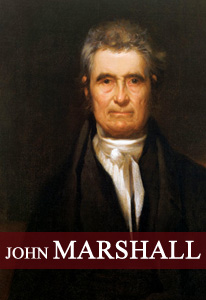|
Marbury v. MadisonIn 1800, the Jeffersonian Republicans won the presidency and control of the Congress from the Federalists. However, before leaving office, President John Adams, acting with the Federalists still in Congress, created dozens of federal judgeships and attempted to fill them before leaving office. By the time Jefferson assumed the presidency, however, several of the judicial commissions had not been delivered. One of the first acts of the newly elected Congress was to repeal the Judiciary Act of 1800 that had created the judgeships and James Madison, the new secretary of state, refused to deliver the commissions.
One of the appointees caught in the middle of the political skirmish was William Marbury, who had been appointed to be a justice of the peace. Not having his commission in hand, Marbury could not assume his judicial post. Believing that he was entitled to the commission, he sued Madison, asking the Supreme Court to issue a writ of mandamus ordering the Jefferson administration to deliver the commission. John Marshall, the Chief Justice of the Supreme Court, immediately recognized the precarious position of the Court in responding to the case. If, on the one hand, the Court agreed with Marbury and issued the writ, the Jefferson Administration would almost certainly ignore the order and the Court would be left looking weak and foolish. On the other hand, if the Court refused to issue the writ, it would appear to be letting a president defy the law. In one of the most significant and famous Supreme Court decisions ever written, Marshall, writing for a unanimous Court, found a way out of the apparently no-win situation (see Marbury v. Madison). Marshall first declared that Jefferson — and his secretary of state — had no legal authority to withhold the commission. The Supreme Court, however, had no authority to issue the writ that Marbury had requested. In the Judiciary Act of 1800, Marshall argued, the Congress had unconstitutionally expanded the jurisdiction of the Supreme Court in giving it the authority to issue such writs. Because that portion of the Act was contrary to the Article III of the Constitution, it was invalid on its face. Consistent with Hamilton’s declarations in Federalist No. 78, Marshall further declared that because the Constitution is law, the judiciary is the branch that should interpret it, not the legislative or the executive. The decision in the case was breathtakingly brilliant. Marshall had managed to tell Jefferson that he had broken the law, but, because the Court had no jurisdiction over the matter, Jefferson had no Court order to disobey. At the same time, Marshall had set the precedent of judicial review, the ability of the Supreme Court to declare acts of Congress “unconstitutional.” While the Court did not use this power again until the Dred Scott decision in 1857, it declared several state laws unconstitutional in the intervening period.
This work is licensed under a Creative Commons Attribution-Noncommercial-Share Alike 3.0 Unported License |
About Us | Terms of Use | Contact Us | Partner with Us | Press Release | Sitemap | Disclaimer | Privacy Policy
©1999-2011 OpenLearningWorld . com - All Rights Reserved




